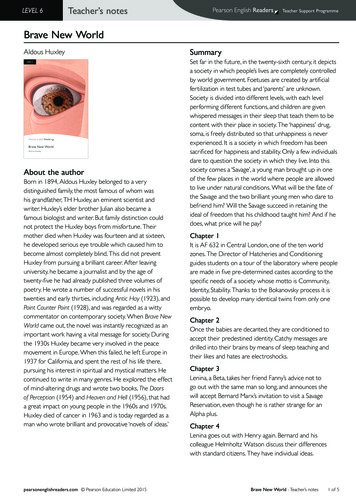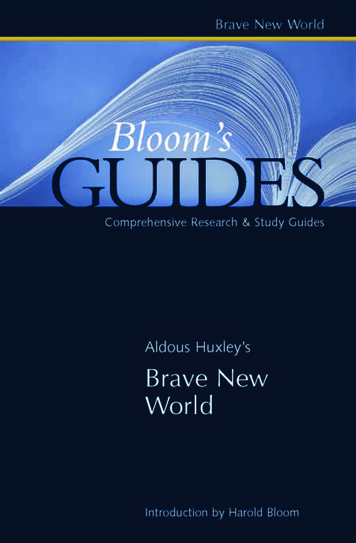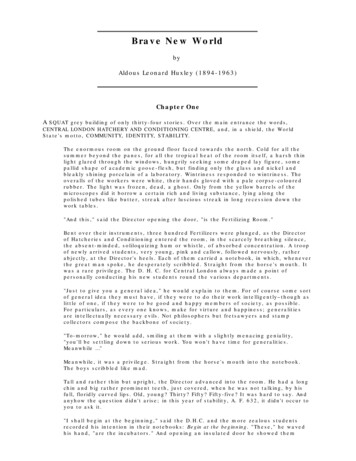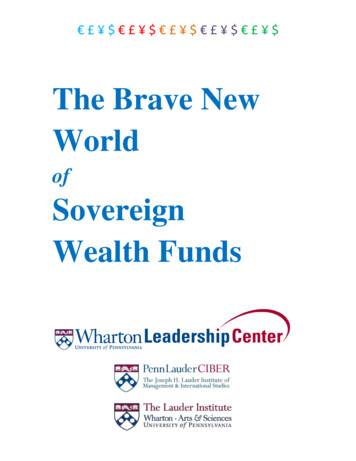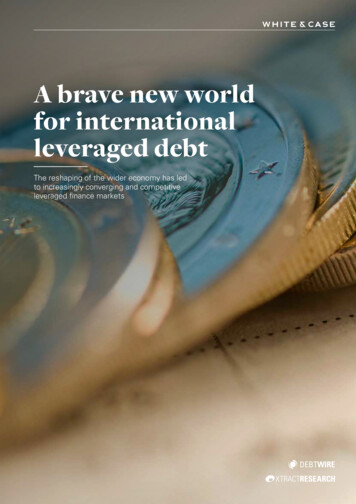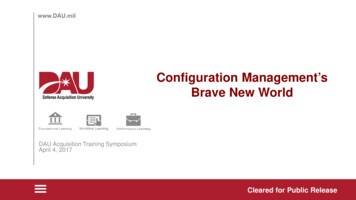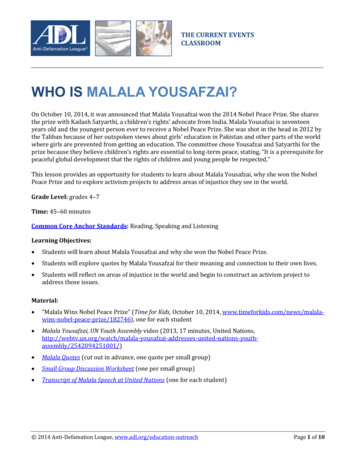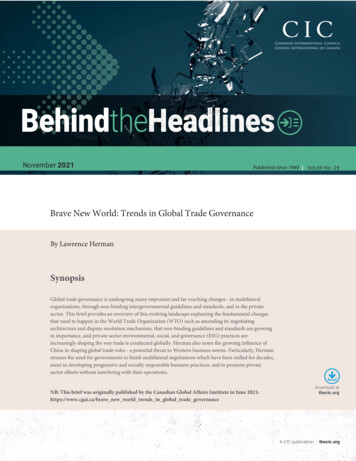
Transcription
November 2021Published since 1940 Vol.69 No. 29Brave New World: Trends in Global Trade GovernanceBy Lawrence HermanSynopsisGlobal trade governance is undergoing many important and far-reaching changes - in multilateralorganizations, through non-binding intergovernmental guidelines and standards, and in the privatesector. This brief provides an overview of this evolving landscape explaining the fundamental changesthat need to happen in the World Trade Organization (WTO) such as amending its negotiatingarchitecture and dispute resolution mechanism, that non-binding guidelines and standards are growingin importance, and private sector environmental, social, and governance (ESG) practices areincreasingly shaping the way trade is conducted globally. Herman also notes the growing influence ofChina in shaping global trade rules - a potential threat to Western business norms. Particularly, Hermanstresses the need for governments to finish multilateral negotiations which have been stalled for decades,assist in developing progressive and socially responsible business practices, and to promote privatesector efforts without interfering with their operations.NB: This brief was originally published by the Canadian Global Affairs Institute in June 2021:https://www.cgai.ca/brave new world trends in global trade governancedownload atthecic.orgA CIC publication thecic.org
About the AuthorCanadian International CouncilPresident and Research Director / Ben RowswellOperations Manager / Catherine HumeChair of the Board / Maureen O'NeilCopyright 2021 by the Canadian InternationalCouncil.The opinions expressed in this publication arethose of the author and do not necessarily reflectthe views of the Canadian International Councilor its Board of Directors.Lawrence L. Herman, of Herman &Associates, Toronto, has practicedinternational trade and investment law andpolicy both inside government and in theprivate sector for over 45 years. He was amember of Canada’s mission to the UN andthe GATT in the 1970s and in law practice hasacted as counsel for Canada in theInternational Court of Justice and as anadvocate before Canadian tribunals, courtsand NAFTA panels. He advises governments,State agencies and internationalorganizations. Mr. Herman is a member ofthe Canadian government’s Trade AdvisoryCouncil, the executive of the Canada-US LawInstitute, the North American Forum and is aSenior Fellow of the C. D. Howe Institute inToronto.Vol. 69 No. 29 November 20212
Introduction - Interwoven ThreadsIn its closing communique, 13 June 2021, following theCornwall summit, the G-7 gave a strong endorsement forefforts at the World Trade Organization to advance "freeand fair trade" on a range of items,1 reflecting the morepositive approach and engagement by the Bidenadministration compared to the sour attitude toward theWTO under Donald Trump.This was an important boost for the organization and forthe global trading system in general, especially in the leadup to the WTO's 12th Ministerial Conference inNovember of this year. With its new Director General nowpretty much in charge, the G-7 consensus gives renewedhope that the Organization can be put on the road toserious reform and that its negotiating agenda can be reenergized.Taking the G-7 endorsement as a staring point, thefollowing looks at important trends in global tradegovernance, starting at the multilateral level, but thendelving down to two other layers of activity, outside offormal treaties or intergovernmental agreements, thatmake up key parts of the system. These are: Intergovernmental-approved rules guidelines - notformally binding under trade agreements or throughnational laws - but developed and endorsed bygovernments impacting on international trade invarious areas and sectors. Private sector standards, best practices andcertifications, frequently overlooked, but whichnonetheless have a major impact on global business,some commentators calling this "private globalbusiness regulation."There is more to the world trading order than these threetiers of activity, of course. Regional and bilateral tradeagreements also occupy a major part of the global picture.But for purposes of this discussion, starting withmultilateralism and the WTO-based governance, the threelevels mentioned above are considered as making upcritical components of the post-pandemic global tradingsystem.One other preliminary point. While not mentioned byname in the trade section of the Carbis Bay communique,the references to modernizing the multilateral rulebook,dealing with market distorting practices of Stateenterprises, intellectual property theft and other concerns,were aimed squarely at China. The China factor is aweighty element in these global trends, must be borne inmind in reading the paragraphs that follow.Multilateralism. Whither the WTO?Well before the recent G-7 gathering, many governmentsrecognized the need for institutional reform andrestoration of the WTO's rulemaking and disputeresolution functions.2 That said, even with a newDirector-General and even with the G-7 endorsement, itremains uncertain whether the institution can regain itsformer vitality as we enter the post-Covid, era.Back in the day - in the last part of the 20th century international trade policy was mostly about keepingtariffs in check and eliminating unfair laws andregulations favouring local over imported goods, withmultilateral rules collected in the 1947 GeneralAgreement on Tariffs and Trade (GATT).As the global economy grew, so did the multilateral order,as more detailed rules were developed and codified overtime, ultimately resulting in the 1994 World TradeOrganization Agreement. The Agreement covered moresectors than the GATT, with new rules for intellectualproperty and services as examples, building on the GATTarchitecture to form a more effective dispute settlementsystem.The WTO has served the international community well,keeping protectionism more or less under control andsettling important, even if not all, trade disputes amongmembers. The pace of events over the last decade, assupply lines became integrated, as e-commerce surged, astrade became digitized and as climate change and zerocarbon policies intensified, revealed serious flaws in theinstitutional structure of WTO and of the rules embodiedin the Agreement.The collapse of the Doha Round 10 years ago was a majorsetback to the organization as a negotiating forum. It hasbeen losing momentum since, while internationalbusiness and supply line integration moved ahead atdizzying speed in an increasingly globalized world. Newchallenges emerged as the world has struggled with thedistribution of Covid vaccines.In her first address to the WTO General Council, thenewly appointed Director General set out an ambitiousagenda to restore the organization to its central role.3While the task is ambitious, reaching into numerousVol. 69 No. 29 November 20213
fields and sectors, Ms. Okonjo-Iweala faces two overarching challenges.One is the need to change the WTO negotiatingarchitecture to facilitate conclusion of plurilateralagreements by like-minded members on issues such as ecommerce, essential medicines, environmentallysustainable goods, where less than the full WTOmembership wishes to participate. Finding a solution tothe present all-or-nothing negotiating paradigm restricting the benefits under plurilateral agreements tothose that sign on - are vital if the WTO is to remaincredible as a negotiating forum.The second involves fixing the WTO’s dispute resolutionmechanism, which consists of a panel system (the triallevel) and an appeal court known as the Appellate Body.The Trump administration’s ire was directed at the latter,insisting that it had far outstepped its mandate and goneoff the rails. Under Mr. Trump, the U.S. governmentrefused to sign off on Appellate Body appointments,paralyzing the entire process. The Biden administration sofar has not indicated a change in the U.S. position on this.Without the Appellate Body in operational mode, tradedisputes can’t reach final disposition, resulting in disputesettlement system - once a crowning achievement of theinternational community - being dysfunctional. Restoringthe health and well-being of the WTO’s judicial arm is thesecond major challenge.Despite the magnitude of these challenges and thedifficulty of herding 164 member governments withdisparate and often opposing interests, the situation is nottotally bleak. The good news is the renewed U.S.engagement in WTO matters, presaging a return to itshistoric leadership role.On improving the system generally, some importantgroundwork has also been laid. The European Unionreleased a comprehensive set of thoughtful ideas earlierthis year. Canada has been bringing together a number ofWTO members in the Ottawa Group, offering useful andcreative reform suggestions.4Thus, there is cautious optimism for consensus actions torestore the organization’s negotiating functions and, atsome point, its dispute settlement functions as well. Evenwithin its unreformed structure, there is the possibility ofagreement on things like fishery subsidies, on ecommence and on some other priority items.Notwithstanding its present wounded state, the WTO stillremains the central organizing body in global trade. Shortof the mark as the current rules may be for dealing with21st century issues, the existing rules - nondiscrimination, MFN treatment, fixed tariff rates,prohibitions on import and export controls, etc. - doprovide the basic framework for a continuing, ifimperfect, global order.Codes of Conduct & Business StandardsAt the second level, below the umbrella of multilateralorder and regional and bilateral treaties, are governmentendorsed standards and guidelines, developed outside offormal treaties but with State involvement, support andimprimatur.Not enshrined in treaties or international agreements andeven if not legally binding or universally applied, thesestandards and guidelines have proliferated and occupy asignificant position in the global trading order. There arehundreds and thousands of these, some more widelyaccepted than others but undeniably an important part ofworld trade.Illustrating the point is the emergence of governmentapproved codes and standards for the conduct ofinternational business. These find mature expression inthe work of the OECD, the foundation being and its theground-breaking OECD Guidelines for MultinationalEnterprises, issued back in 1976.5 Since the MNEGuidelines were issued, the OECD has developed a slewof non-binding guidelines responsible business conductthat member governments have approved, mostly in anon-legislated way, companies should behave in theglobal marketplace.The OECD website says, "Responsible business conduct(RBC) sets out an expectation that all businesses regardless of their legal status, size, ownership or sector avoid and address negative impacts of their operations,while contributing to sustainable development in thecountries where they operate."6It goes on to note how these standards can shapegovernment policies and help businesses minimise theadverse impacts of their operations and supply chains,while providing a venue for the resolution of allegedcorporate, social, environmental, labour or human rightsabuses. The OECD has also developed sector-specificguidance for the minerals, agriculture and garment andfootwear supply chains, and good practice papers for theVol. 69 No. 29 November 20214
extractive and financial sectors, developed in co-operationwith governments, business, trade unions and civilsociety.While not binding under international trade agreementsor enacted into law by governments, these guidelines havebeen endorsed by OECD members and have beeninfluential in channeling private sector behaviour in suchareas as human rights, labour practices and sustainabledevelopment objectives.7As stated on Global Affairs Canada’s website,"Multilaterally, Canada promotes international standardsfor RBC in a number of fora including the OECD, theGroup of Seven, Asia Pacific Economic Co-operation andthe Organization of American States. Participation inmultilateral fora provides Canada not only an opportunityto share knowledge, but also to work together to promoteand strengthen international RBC guidelines for thebenefit of all stakeholders."These State endorsed business practice standards are thuspart of the 21st century global order that, together withbinding treaty obligations under the WTO umbrella, thesewill play an increasingly important role, channellinginternational commercial and business activity in meetingever-demanding public expectations. As the world turns,it is expected that these second-tier internationalinitiatives will increase, adding a significant and growingdimension to the global trading order.Importance of Private Sector ActionThe above has described two levels of the State-regulatedglobal trading order. Private sector standards, guidelinesand product certifications issued by a variety of non-Stateactors occupy a third tier, sometimes described as "privateglobal business regulation."8Even if not enshrined in treaties or State legislation, theyinfluence the way international business is conducted inimportant ways. As one commentator has observed,"Private regulation is a large and growing field ofregulatory activity. Industry associations set health andsafety standards for their member companies. Companieswith global supply chains establish codes of conduct fortheir foreign suppliers regarding treatment of workers andthe environment. Companies join voluntary programsthat certify and label their consumer products to indicatecompliance with social and environmental criteria.Private auditors are hired to assess corporate compliancewith rules and standards developed by both governmentsand private entities. In all these forms of privateregulation, private actors engage in developing andimplementing rules that serve the traditional social goalsof public regulation, particularly health, safety, andenvironmental protection.9The current impetus to move to a net zero carbon futurein compliance with Paris Agreement targets is anexample of private standards affecting the conduct ofinternational business, notably in respect of sustainabilityand climate change, where financial and investorpressure has forced corporate action in acceptingvoluntary compliance.One of the best illustrations are the environmental, socialand governance (ESG) risk assessment models,integrating ESG factors in investment decision-makingand applied at the enterprise level independently of legalrequirements.10 ESG evaluations and sustainable businesspractices are now widely applied in the extractive(mining) sector, including those under the auspices of theIntergovernmental Forum on Mining, Minerals, Metalsand Sustainable Development (IGF).11Business practices related to employment and humanrights in foreign operations are expanding in theinternational fashion industry, another case in point.12These are likewise independent of treaties or laws butreflect private sector responses to market factors.Some of these private standards are based on, orinfluenced by, the work of the OECD Centre, discussedabove, as well as the International Chamber ofCommerce, which has issued guidelines on responsiblesourcing - supply chain responsibility – a example ofprivate business responding to the market and managingrelations with suppliers.13One simple illustration is the acceptance by Walmart,Home Depot or Amazon of a commercial, non-legislatedstandard – perhaps even a standard of their ownformulations – could be as commercially significant as atariff reduction on that particular product.14Product endorsements and certifications, notably in theenvironmental sustainability, human rights, and fairtrade domain, are another factor and an addedsignificance in shaping public and consumer attitudesand affecting international business.Among the earliest of these was Fairtrade InternationalVol. 69 No. 29 November 20215
and its companion certification body, FLO-CERT,covering a wide range of products, including bananas,honey, oranges, cocoa, coffee, shortbread, cotton, driedand fresh fruits and vegetables, juices, nuts and oil seeds,quinoa, rice, spices, sugar, tea and wine.15In the same category are green endorsements, such as theForest Stewardship Council (FSC), showing consumersthat the products were ecologically sustainable.16 FSCcertification has become widely accepted, aided by thedecision of companies like Home Depot and other massretailers to require the FSC stamp of approval from theirsuppliers.In the fashion industry, referred to above, WRAP is anindependent non-profit team of global social complianceexperts dedicated to promoting safe, lawful, humane, andethical manufacturing around the world throughcertification and education.In the human rights field is Better Work, a partnershipbetween the UN’s International Labour Organization andthe World Bank’s International Finance Corporation,bringing diverse groups together – governments, globalbrands, factory owners, and unions and workers – toestablish guidelines to improve working conditions in thegarment industry with a focus on developing countries.17The above are samplings of private, non-binding rules,standards and best-practice guidelines – “private globalbusiness regulation” – that will continue to influenceinternational business and trade as a key part of the 21stcentury global order.Returning to the point made at the outset is the increasinginfluence of China in many private internationalstandard-setting bodies. Recent commentaries haveexpressed concern that it is aggressively engaged inattempts to set standards for 21st century technologies toits own benefit, a clear warning to western business andgovernments.18Concluding CommentsWhether and how the WTO revives itself over the comingmonths and years as governments attempt to findsolutions to the institutional malaise, its umbrella set ofrules remain as foundation blocks of the global order:bound tariffs, non-discrimination, prohibitions on exportand import controls.While not always respected and while full of built-inexceptions, WTO/GATT-based rules provide an orderlymultilateral framework, even with ongoing tensions anddisputes.19 It is up to governments to find the collectivewill - as called for in the recent G7 summit - to furtherthe global community’s unfinished multilateral efforts inthis area.As to the subsequent tiers described above, governmentshave other roles to play in furthering the development ofprogressive and constructive business practices and codesof social responsibility on matters such as human rightsand as the world advances to meet the Paris Agreementon net zero carbon.This means supporting the work of rule-formulatingintergovernmental bodies like the OECD, the WorldBank and others. Because this tier is also an integral partof the global order, governments must maintain aprogressive sense of responsibility in furthering the rulemaking activities of these bodies.With respect to private global business regulation,governments have a different task, which is to notinterfere in valuable private sector activities but,recognizing their contribution to global order, topromote their work and to help ensure theirtransparency, non-discrimination and technical/scientificcredibility.In each of these three levels there is the spectre of China,increasingly active in efforts to channel rules, guidelinesand standards to its own benefit, a cautionary note forwestern governments and business enterprises to bevigilant.To summarize this high-level review, these three levels ofactivity comprise the collectivity of major trends as theworld emerges from the pandemic crisis and movesforward to a net zero-carbon future. The message is thatgovernments and private business have a commoninterest and collective responsibility in furthering actionsat these three levels which, collectively, contribute to theprogressive development of global order in internationaltrade.***NB: This brief was originally published by theCanadian Global Affairs Institute in June 2021: https://www.cgai.ca/brave new world trends in global trade governanceVol. 69 No. 29 November 20216
References1 Theopening paragraph in the trade section of theCommuniqué says, We stand united in our commitmentto free and fair trade as foundational principles andobjectives of the rules-based multilateral system. We agreeon the need for the world’s leading democratic nations tounite behind a shared vision to ensure the multilateraltrading system is reformed, with a modernised rulebookand a reformed World Trade Organization (WTO) at itscentre, to be free and fair for all, more sustainable, resilientand responsive to the needs of global 61/carbisbay-g7-summit-communique.pdf.This point was reflected in the separate G7 TradeMinisters’ meeting several weeks before the heads ofgovernment summit: Trade Ministers’ Communiqué, 28May ws e/spno e/spno1 e.htm3Alan Wolff, recently retired as a WTO Deputy DirectorGeneral, now at the Peterson Institute in Washington,D.C., has provided ideas for the Ottawa Group to movethe WTO forward in the post-pandemic or-Responsible-Business-Conduct.pdf. TheMNE Guidelines are incorporated in a range of laterOECD instruments, including: the G20/OECD Principlesof Corporate Governance; the Guidelines on CorporateGovernance of State-Owned Enterprises; the CommonApproaches for Officially Supported Export Credits andEnvironmental and Social Due Diligence; the PolicyFramework for Investment; the Recommendation of theCouncil on Public Procurement; and theRecommendation of the Council for Further CombatingBribery of Foreign Public Officials in InternationalBusiness Transactions.6The World Bank is another organization that has issuedstandards and guidelines respecting enterprises engagedin Bank projects: ability-Principles-2017.pdf. And thereare many other examples, including by the regionaldevelopment banks.Vogel, D., “The Private Regulation of Global CorporateConduct” in The Politics of Global Regulation (ed. WalterMattli and Ngaire Woods, 2009).8McAllister, L. K., “Harnessing PrivateRegulation,” (2014) 3 Michigan Journal of Environmental& Administrative Law: 291.9An illustration of the role of non-legislated ESG andRBC standards is in the financial reports of transnationalcorporations. Consider Barrick Gold Corporation, aprime example where large parts of its annual report aretaken up by environmental sustainability and humanrights factors:https://s25.q4cdn.com/322814910/files/doc downloads/policies/policies and standards/Co de-of-Conduct.pdf.See: Investment Governance and the Integration ofEnvironmental, Social and Governance Factors, OECD(2017).10These corporate actions under the IGF and otherdevelopments in CSR are collected and reported byInternational Institute of Sustainable Development(IISD): https://www.iisd.org.11Perry, P., Wood, S., “Exploring the InternationalFashion Supply Chain and Corporate SocialResponsibility: Cost, Responsiveness and EthicalImplications,” in Fernie, J. and Sparks, L. (eds.) (2019)Logistics and Retail Management, 5th Edition.1213ICC Guide to Responsible Sourcing, ICC 2008.For example, Home Depot in its 2018 ResponsibilityReport (posted on its web-site) states its commitment toethical sourcing and social and environmental (SER)standards and conducts audits around the world toensure its suppliers meet these dards: “Fairtrade Standards distinguish between corerequirements, which producers must meet to be certified,and development requirements that encourage producersto continuously improve and to invest in the15Vol. 69 No. 29 November 20217
development of their organizations and their workers.This concept is developed for the target group ofFairtrade: disadvantaged producers and workers. Itencourages sustainable, social, economic andenvironmental development of producers and bout-us.These and other best-practice-formulatingorganizations in a wide range of sectors are listed on theCSR Compass website: ndustry.17“China and the New Geopolitics of TechnicalStandardization”, Institut Francais des RelationsInternationales (I’Ifri), January 2020; “China’sParticipation in International Standards Setting: Benefitsand Concerns for US Industry”, Kemensky, J, AmericanNational Standards Institute newsletter, February 2020;“We cannot let China set the standards for 21st centurytechnologies”, The Hill, 16 April 2021.18Herman, L. L., “International Law in a TurbulentWorld,” (2017) 41 Canada-United States Law Journal: 1.19Vol. 69 No. 29 November 20218
About the CICThe Canadian International Council (CIC) is Canada’s foreign relations council. It is an independent, non-partisanmembership organization and think tank dedicated to advancing constructive dialogue on Canada’s place in theworld and providing an incubator for innovative ideas on how to address the world’s most pressing problems.The non-profit CIC integrates the voices of a diverse and multidisciplinary group of societal actors from academia,business, civil society, government and the media, and endeavours to inform and develop the capacity of the country’snext generation of foreign policy leaders.One of Canada’s oldest and most respected think tanks, the CIC is not only dedicated to nurturing dialogue onCanadian foreign policy domestically, but also in protecting a Canadian perspective on the international stage. In ourrapidly changing world, this effort to promote greater understanding and foster meaningful debateon critical challenges is more important than ever.The CIC would like to thank the Konrad Adenauer Stiftung Canada for their generous support in developing theRenewing Our Democratic Alliance (RODA) project, which includes this series of articles.Canadian International Council6 Hoskin AvenueToronto, OntarioM5S 1H8thecic.orgthecicBehind the Headlines November 2021
download at YMeorL A CIC publication eorL 1VCMJTIFE since ] 7l. . Brave New World: Trends in Global Trade Governance By Lawrence Herman Synopsis Global trade governance is undergoing
